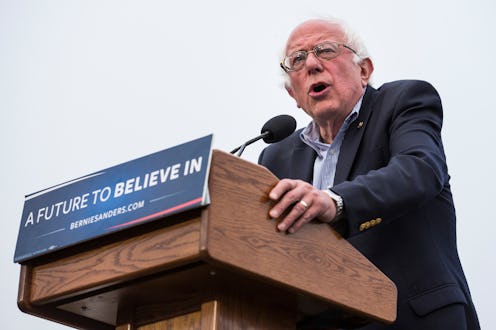News
What Bernie Sanders Will Do Next
Sen. Bernie Sanders has said time and again that he's in this thing until the Democratic National Convention in July, where the party will officially name its nominee for the 2016 general election, so we have no reason to believe he'll be ducking out of the race even if he doesn't overcome Sec. Hillary Clinton's near-insurmountable delegate lead. Clinton officially declared herself the winner of the primary race Tuesday night. So, what does he plan to do before the convention to tip the odds in his favor, and what's next for Bernie Sanders before the convention?
Sanders has expressed the intent to clinch the nomination by earning enough superdelegate support to overcome the delegate gap between he and Clinton, which remained fairly constant throughout the primaries up to June 7. So we can expect him to spend a fair amount of time in contact with supers he sees as persuadable, trying to convince them that he will be a more formidable challenger to presumptive Republican nominee Donald Trump in November. If neither Democratic candidate achieves a delegate majority in the primaries, it'll be up to the supers to tip the nomination one way or the other.
But Sanders' interest in the convention goes beyond winning the nomination; he's working to shift the Democratic Party platform in a more progressive direction. We can expect Sanders to spend some of his time in June and July in conversation with the five people he selected to sit on the party platform committee, which will shape the official platform. The Washington Post reported that Sanders and his selections will push to get a carbon tax, single-payer health care, and aggressive action against big banks onto the party platform.
If Sanders makes fundamental progressive changes to the Democratic Party, it will be a tremendous victory for the candidate as well as his supporters. But perhaps the most crucial measure of Sanders' success will be whether the momentum behind what he has called the "political revolution" dies after July or continues on, even if Clinton is the nominee. Sanders himself is one man, not a revolution or a movement, but it'd be a surprise if he didn't take it upon himself to fan the flames of the fire he started.
Sanders can do so in a number of ways after the election. The Vermont senator's congressional term isn't up until 2018; we can expect him to return to the Senate to push for progressive policy there. Sanders has also begun making efforts to get other progressives into offices at various levels of government. In April, he endorsed and helped fundraise for three progressive Congressional candidates. And, in May, he endorsed eight candidates for state legislatures. Bringing awareness of down-ballot elections to his massive supporter base and mobilizing them to elect progressive candidates locally, state-wide, and nationally will be one of the best ways Sanders can encourage the "revolution" to continue on.
Going forward, we can expect Sanders to push hard for the nomination, a progressive party platform, and a more progressive government on all levels. Ultimately, it will fall on Sanders' supporters to stay engaged in the political process and continue to advance the policies this most unlikely major-party candidate has brought into the spotlight.
